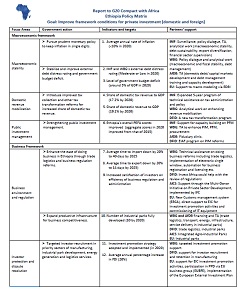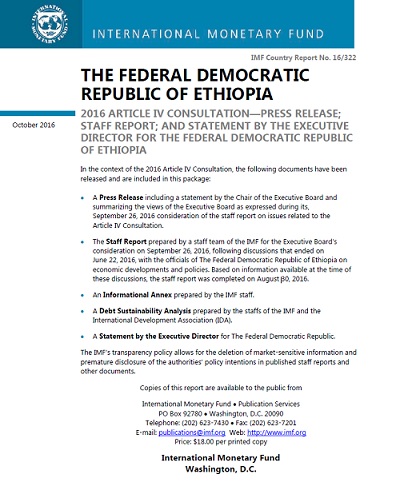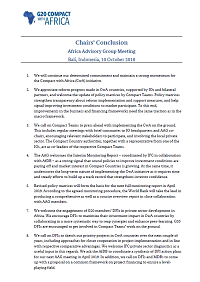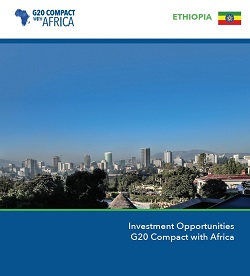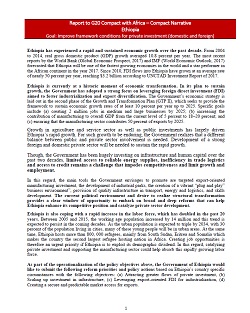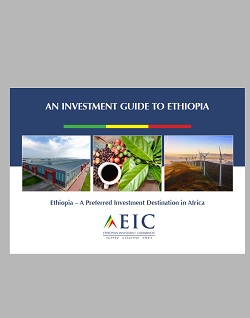
Ethiopia has achieved remarkable economic growth. Over the past 15 years, real GDP growth has averaged over 9 percent a year—compared to a regional average of less than 4 percent. To help sustain economic growth in face of emerging challenges associated with a public-investment led growth model, the country launched in 2019 a Homegrown Economic Reform (HGER) agenda with the primary objective of advancing private investment and structural transformation. Ethiopia is now embarking on HGER2.0, which aims to address remaining challenges to make Ethiopia a “African Beacon of Prosperity” by 2030. Key pillars of the strategy are establishing macroeconomic stability, creating a conducive environment for trade and investment, and improving productivity in key sectors.
Key Indicators |
||
| Population in millions, 2022 | 104.1 | |
| GDP per Capita, U.S. dollars, 2022 | 1156 | |
| GDP Growth, percent, 2022 | 6.4 | |
| Inflation, CPI average, change in percent, 2022 | 33.9 | |
| General Government Debt, percent of GDP, 2022 | 46.4 | |
| Source: WEO, October 2023 | ||
Energy

- Ethiopia is endowed with abundant renewable energy resources and has a potential to generate over 60,000 megawatts (MW) of electric power from hydroelectric, wind, solar and geothermal sources.
- Ethiopia targets to increase power generation to 17,000 MW (from existing 4370MW) by 2020 and plans to increase exports to neighboring countries.
- The Grand Ethiopian Renaissance Dam - the largest hydroelectric power dam in Africa set to generate additional 6,450 MW electricity.
- Geothermal generating capacity: 5,000 MW. Wind power generating capacity: 10,000 MW. Hydro power generating capacity: 45,0000 MW.
Textile and Apparel

- Plan 2020: Generate US$ 1 billion export earnings and over 300,000 employment opportunities.
- Potential areas of operation: ginning, integrated textile mills, spinning, weaving and/or knitting, dyeing and printing, garment factory (knitted/woven).
- Established the Ethiopian Textile Industry Development Institute to enhance skills and technologies in the sector.
- Large land size and conducive climatic conditions for cotton and fibres production: Over 2.5 million hectares of land is dedicated for cotton production.
- Currently five industrial parks dedicated for textile and garment sector
- Major Brands Investing in Ethiopia: PVH Corp: American clothing giant and owner of the big global fashion brands such as Tommy Hilfiger, Calvin Klein, Speedo, IZOD, Van Heusen, Arrow, Warner’s and Olga.
Leather & Leather related manufacturing

- Plan 2020: Generate US$ 800,000 million export earnings and over 300,000 employment opportunities.
- Potential areas of operation: processing and export of finished leather, shoe, gloves, bags and small leather articles.
- Established the Ethiopian Leather Industry Development Institute to enhance skills and technologies in the sector.
- Large population of livestock: More than 53 million of cattle, and sheep and goat populations of 25.5 and 24.1 million, respectively. 9th from the world and 1st from Africa.
- Major Brands investing in Ethiopia include: Pittards PLC: British based company, has been investing since 2011. In 2014, the company exported 100,000 gloves for international market. It employs more than ~700 workers.
Agro-processing & Horticulture

- Abundant and high-quality input for agro-processing due to large land size (8th largest country in Africa and 27th in the world) and huge proportion of arable land; diverse topography and agroclimatic zones and water availability for irrigation.
- Ethiopia is home to some of the world’s best specialty coffee varieties such as Harrar, Sidama, Yirgacheffe and Limmu.
- Ethiopia has one of the fastest growing floriculture sector. It is now the second largest flower exporting country in Africa and the fourth in the world.
- The European and Middle Eastern fruit and vegetable markets offer significant export opportunities for Ethiopia.
- Development of special clusters for horticulture development and integrated agro industrial parks as a key vehicle.
- Major Brands investing in Ethiopia include: Africa Juice Tibila S.C: A Dutch company that employs more than 2,000 people to process passion fruit for export, and produce fruit and vegetables for the domestic market.
